

Bill Haslacher interview
By Scott Stilphen
(2006)
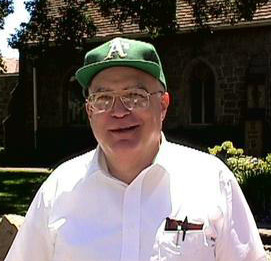
It’s always a treat to speak with former Atari personnel, especially when they have vivid memories of their experience there, and as you’ll soon learn, our conversation with Bill Haslacher is no exception. Although he was only at Atari for 2 way-too-short years, if you had to pick 2 years to be there, 1980-82 would be an excellent choice. Atari’s future never looked brighter, and many folks (both inside the company and out) felt they could do no wrong. So read on, and journey back… to when Atari was King.
Q: What’s your educational background?
Bill Haslacher: I went to the University of Oregon for my first 2 years of college, and graduated from San Jose State University with a BA in psychology and a minor in journalism in 1967. In 1969, I attended the Control Data Institute. They gave students "hands on" experience with an IBM 360. I learned COBOL, FORTRAN, Assembler, and PL/I.
Q: What inspired you to become a writer?
Bill Haslacher: Since age 12, I've wanted to be a newspaper reporter. I felt reporting would give me a good excuse to find out what makes people tick. I got high marks in English and writing classes.
Q: Did you work for anyone prior to Atari (after school)?
Bill Haslacher: Before Atari, I had jobs as a Macy's clerk, a typesetter, and in 1971-1972 I wrote for the radical underground newspaper, The San Jose Red Eye. I did some reporting for the Antioch Ledger and Gilroy News-Herald. The work I did for Questdata got me the job I had at Atari. Questdata was a newsletter that I started from ground zero in 1978, for the RCA microprocessor. Someone was kind enough to put Questdata on the Web: http://www.sbrune.com/COSMAC/Questdata_Vol_1_Issue_8.pdf
On one of the msn boards, a fellow commented that Questdata teaches programming like a good college text. Ha! My objective was to bring Hex programming down to the 6th grade level. But one of my friends reminds me that America has been dumbing-down and today's college freshmen read at a 6th grade level!
Q: How did you hear about Atari? When did you start working there?
Bill Haslacher: Because Atari started up in nearby Los Gatos, news about the fun they were having would drift my way, even when I was working as a Macy's clerk in 1973. I remember one of the people I waited on described his job at Atari in glowing terms and said they were developing some great racing games.
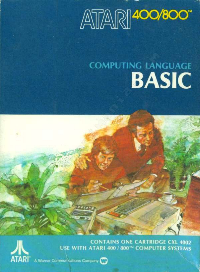
Q: Were your duties mainly as a technical/manual writer? Did you work with only one system (such as the 400/800)?
Bill Haslacher: I mostly wrote and re-wrote technical documents such as the Atari Microsoft BASIC and Assembler manuals. I worked only on the Atari 400/800 computer. Once, I was assigned to write a game manual but was switched out of that when a technical manual came up. I remember writing some "box copy" for a product.
Q: I’m aware of your work with the 400/800 Demo. Were you mostly involved with games or application software?
Bill Haslacher: Exclusively with applications such as a graphing program, a statistics program, a macro assembler, an editor, a double density dual-disk drive, and, of course, Atari Microsoft BASIC.
About all I remember about the 400/800 Demo is that the programmer wrote it in FORTH and I did the manual. Marketing peeked over my shoulder a lot on that one.
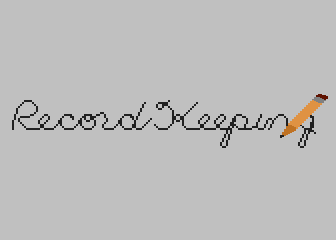
Q: Was it because it was a high-profile title for them?
Bill Haslacher: I'll give you a blunt, honest answer. It was because they demoted Steve Harding, one of the finest bosses I've ever had. Harding shielded the writers from Marketing. He would not let them phone us directly. The new boss let Marketing phone us. And, phone they did. Also, Marketing felt a good demo cart would sell the system.
Q: What was the development process like? Did the programmers give you notes to use?
Bill Haslacher: I worked very closely with programmers. I asked them everything about the programs, even about program bugs and limitations. Atari programmers admired the tech writers. I noticed at AT&T, Amdahl, Fortune Systems, Sun, and Intel, programmers regarded tech writers as a thorn in their side. At Atari, we were partners and the programmers were very open to any ideas the writers had about products.
Q: Did you have any contact or involvement with the art department?
Bill Haslacher: Yes! When I stood up in my cubicle, I could look down upon Terry, an artist in the cube adjacent to mine. The artists used to “steal” body parts from us. One time I noticed an artist staring at my eyes. Later someone pointed out that one of the people on the cover of a manual had my eyes. Oh, one day I brought in the radical underground Red Eye newspapers to show the artists. They loved the art in the Red Eye and knew many of the Red Eye artists and what they were doing now.
Q: Were the titles you wrote for assigned, or chosen by yourself?
Bill Haslacher: Titles were assigned by the bosses.
Q: Were there any games or projects that you worked on that ultimately never got released or even finished?
Bill Haslacher: I'm not sure if the Double Density Dual Disk drive ever got released or sold in quantity. The Cube Project was some kind of early AOL type of online community that Warner did. I reported directly to people at Warner on that one. I never heard what happened on the project, but the gal who edited my writing did a wonderful job.
I also worked on an accounting project that was put on hold. It was later revised and released. Whoever did the follow-up documentation did an excellent work and kept my visual - a menu-tree.
Q: Do you recall any other titles that other programmers were working on that were never released, or finished?
Bill Haslacher: Steve Wright told me that lots of stuff didn't get released. He said it was frustrating for programmers to work on a project only to have it scrubbed by Marketing, but that programmers were sometimes glad to see it get dropped - a game may seem great in your head, but when you actually try to do the game, it just doesn't work.
Q: Do you recall any fellow co-workers put Easter eggs in any of their programs? Did you do anything similar with any manuals you wrote, such as referencing someone?
Bill Haslacher: We did not get our names in manuals. I wouldn't know how to do an Easter egg in a manual. I know that Steve Wright is credited with coining the term "Easter egg".
Q: What were some of your experiences working for Atari?
Bill Haslacher: Memories. All you got left when the liven' is done are memories. And I have the most and best memories of Atari - much better memories than, say, doing stuff at Amdahl. What kinda memories can you make sitting in a closed room in front of a VT-100 terminal? Your instructions on what to do for the day come via E-mail and meetings. The meetings were sad. So you sit in front of your terminal all day typing stuff about TCP/IP.
By contrast to an Amdahl, Atari was heaven. OK, perhaps the money was better at Amdahl, but I'll take Atari. I'm retired now and can do what I wanna do. And if there was another Atari around... well, I'd volunteer to work for them. For Free.
Of course, Atari changed. It became more like a big corporation. I didn't like the big Atari as much as when everyone was housed in the Engineering building on Borregas Avenue.
Aye Borregas the place is still standing,
the things that you've shown us,
the stories you tell
Aye Borregas, I sing to your spirit,
the men who have engineered there long and so well
Hi dee ay-ee ooo doo-dle oh
oo do do do do do doo-dle ay yee
doo-dle ay ee
Ah, Borregas! Home of all that creativity. To get an idea about what made Atari a joy to work for, might I recommend my article, “What Went Right at Atari?” That was the last thing I wrote for Hi-Res Magazine. As West Coast something-or-other, I wrote two other stories for them. Hi-Res never paid me for “What Went Right at Atari”, and would you believe that one of the editors called me up and asked why I hadn't sent in any articles recently. Ha! "It is on account I haven't been paid for the last one, you silly goose." The gall of some people.
Q: Any stories or anecdotes from those days that you recall?
Bill Haslacher: Atari was the most fun I've ever had on a job. With time, I have even learned to love Fred Thorlin my boss on the Atari Microsoft BASIC project. But, I just have to tell you about an epiphany, or high point of my life, I had, thanks to Fred Thorlin.
One day, Thorlin, my hard edged boss of the Atari Microsoft BASIC project, looks across a table at me and says, "I've got to go run get the specs. Here, Bill, talk on the phone with Bill Gates." I knew well who Bill Gates was from my experience with the Homebrew Club where Gates once wrote us a letter saying we were stealing his BASIC and putting it on our little machines for free. Here's my phone chat with Gates:
Me: “Hello.”
Gates: “Hello, you aren't giving us enough time to write the code for Atari Microsoft BASIC.”
(This wasn't the pleasant conversation I expected. It was like being thrown against a wall. Gates sounded irritated.)
Me: “Well, they're not giving me enough time to do the documentation, either.”
My remark seemed to cool him off. We talked pleasantries, and then Thorlin saved me by coming back with the specs. Bill Gates sounded human and his remark about not getting enough time to do the software was true. I later learned that Atari had written the contract so that if Microsoft slipped the due date, Atari would pay them less.
As you know, I was part of the Home Computer division. But, in the original Engineering Bldg., we shared space with the 2600 or VCS people. What is really burned into my memory are the Atari labs and Steve Wright. That's how I came to know and admire Steve Wright. Steve Wright is the most wonderful person. He was always full of good cheer. And talk was his medium. Such a showman. Steve was the only guy I knew who actually met with Ray Kassar on a regular basis. He would be watching one of the expensive machines that showed exactly what line of code was executing as he talked to me about his latest meeting with Kassar. Would you believe Kassar is rumored to once have said to the game programmers, "I know you, you're towel designers."? (Ed: According to David Crane, this is what Kassar told him and the other programmers who left to found Activision, when they asked for fair compensation for their work - LINK). Ray did not exactly rub elbows with the troops. I guess it is old school to remain above the fray.
Anyhow, Steve Wright had a quick wit and a ready smile. I thought he would some day be the President of Atari – he had the “Wright” stuff. Talking to him in the lab, it was like he was always on stage. If he was any more upbeat, we'd have thought he was on drugs. He did Pele’s Championship Soccer, and I remember him saying, "I'm the greatest in the world at Pele’s Soccer right now, but hours after it’s released to the public, some young kid will be...". I wrote a short article about him in the first issue of Hi-Res.
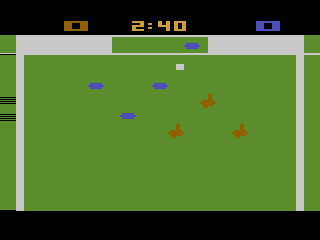
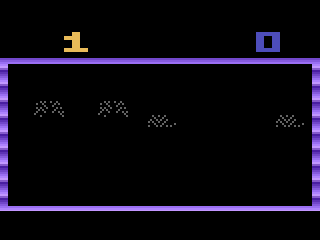
Q: Funny how he advocated a “thumb” grip back then; now almost every controller is designed around primarily using your thumb!
Bill Haslacher: Boy are you correct. Steve Wright saw the future like nobody else. I think he is the first to figure out that "thumbs rule". He did the first "for enjoyment only" thing when he did a firework display during half time for the soccer cart, and he also made a bug into a feature - they had this NTSC stripe thing that followed the players and Steve called it the “ref”!
Q: Who was Clyde Grossman that you mentioned in the article? What division did he work in, or do you know what games programmed?
Bill Haslacher: Clyde Grossman was a programmer in the Home Computer Division. I know he did some work on Atari Microsoft BASIC because he is copied in a memo that I discovered under my bed recently. The "interoffice memo" talks about how the Break key should be able to resume a program when the Continue statement is entered - interesting stuff like that. I don't know what other projects Clyde worked on. I remember that he made a cute animated Christmas scene on the Atari Computer on Christmas. It was like a modern screen saver. Grossman had a tree with blinking lights and a dog hopping around and a train set going in circles.
Another guy who was great to hang out with was Lane Winner. Lane wrote graphics programs in BASIC that showed off the ANTIC chip. Oh, I guess I gotta retrace my steps here. One day, about a year into my working for Atari (make it 1981), my boss, now Embee Humphrey, calls us into a meeting. Seems the Atari 400/800 computers have a hidden graphics mode called ANTIC. Previous to ANTIC, everyone had been using CTIA graphics (NOTE: I'm not sure if, previously, we were using CTIA or GTIA. I think GTIA is the technical name for the ANTIC chip, but I'm not sure). At the meetings that followed, Chris Crawford and others handed out papers on how to access ANTIC and what it could do. Why did ANTIC just come into our lives one sunny day in 1981? Well, it is because the chips on the early shipments of the 400/800 computers had chips that they couldn't get to work. But someone had fixed the chip problem and now ANTIC was here.
A magazine thought the name was so cool that it adopted it. Thus was born ANTIC magazine for the Atari Computers. ANTIC is a whole story in itself. My friend, James Catalano (Ed: of Atari 2600 Doom hoax fame - see HERE and HERE) wrote some cool games published in ANTIC. One thing got James about ANTIC - the ANTIC slogan adopted right before the magazine folded: "ANTIC: We will always be supporting your Atari Computer."
And there was the Atari game room with its free games. On lunch breaks we could go play a huge selection of games in the FREE game room in the Marketing Bldg. Lots of racing games, a football game… great stuff. Also, our Schledge key cards could get us into Coin-Op where we'd play Missile Command and Tempest. We’d play these games 6 months to a year before the public. Atari was king of the mountain and it looked like nobody was gonna push them off. Heady feeling. Wonderful days.
Q: Have you stayed in touch with any of your old fellow ex-Atari co-workers?
Bill Haslacher: Yes! I think the freedom Atari gave people helped everyone bond. Even after 26 years I still keep in close touch with Milt Brewster, a fellow technical writer, and Harry Brown, a game tester and programmer.
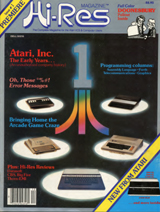
Q: When did you leave Atari?
Bill Haslacher: I left Atari in 1982 and after working for them for two years. The company had changed so much in the 2 years that I was with them that I no longer loved them. The Computer Division was housed in its own building - isolated. I missed the 2600 guys. I wanted the "less bureaucratic" Atari! I didn’t even have another job lined up, besides writing for Hi-Res. I was foolish to quit.
About this time Harry Brown tells of going to a meeting where the topic was, "How many lines of code should a programmer write in an hour? In a day?" About two hours into this meeting, Harry stood up and announced that he had to leave the meeting to go write some code!
Q: Do you still own copies of any of the games or manuals that you worked on, either as a keepsake, or to show friends or family?
Bill Haslacher: Yup! I still have copies of all the manuals I worked on. I've never shown them to friends. I have a collection of early microcomputer literature I show to friends. James Catalano used a copy of a Video Brain advertisement I have in my collection in one of his 'zines. I guess my Atari manuals are a personal keepsake. Is that redundant? Are all keepsakes personal?
I recently found another wonderful old piece of history. To wit: Atari's Oct 9, 1981 Pot Luck. Greg Weiner's actual memo:
Inter Office Memo Atari
To: P.C.S. Software 81-GW-0343
From: Greg Weiner
Subject: Birthday Pot Luck Date: 9-25-81
On Friday, October 9, we are going to have a birthday pot luck here at work. I will be putting up sign up sheets so you can choose wheat you would like to bring. We will not only need people to bring food but we need people to bring plates and other things. So start thinking about what you would like to bring. We will also have a prize for the best dish. People with birthdays in October are Lisa Bailey, Kathy Bergthold, Jim Dunion, Kathleen Pitta, and Lane Winner.
As I recall, Greg Weiner was Ray Kassar's Chauffeur before he went to P.C.S. Software. People have told "stories". In particular, I remember Harry Brown telling me stuff. The strangest darn thing was my Atari Microsoft BASIC book. A former Kassar chauffer insisted my writing was too complex and, “That BASIC book HAS to be entirely rewritten!”.
Q: Can you describe your career, between then and now, and why you left the video game industry?
Bill Haslacher: After Atari I worked at a company called COSMOS Systems, who made a UNIX computer. I had a fantastic boss, Li-Chen Wang, and they took me to Chinese restaurants a lot. Dr. Wang wrote a version of Tiny BASIC for the 8080 microcomputers, and, unlike some people, put it in the public domain so all the Homebrew Club members could use it for free, without guilt.
I’ve since worked for many computer companies as a contract technical writer. I always thought of myself as a computer guy. I’ve spent most of my career writing MAN pages for UNIX Systems. Hey, it's a living. The pay was good. Computer tech writers were paid about the same as programmers and I felt it was a solid career path. Little did I suspect how volatile the computer industry was gonna be. Most of the companies I have worked for are no longer in business. This is not because I worked for startups or lousy companies. Only one in 20 startups makes it. It’s true. But, I did UNIX documents for a computer group in Oakland that had a wonderful and dedicated group. Wonder what my boss, Scott Garrison, is doing now that AT&T no longer makes or supports UNIX. I'm sure he's doing something great, but it's not with AT&T.
Q: What are your thoughts on how the industry has evolved?
Bill Haslacher: I once asked Steve if (dedicated) game machines have a future or does the future belong to the personal computer alone, to which he replied there would always be a place for dedicated game machines: "’Joe six-pack just’ wants to slap in a cartridge and play”. The “PC or platform” debate continues and is even accelerating, what with online gaming and the need to have an edge in, say, Worlds of Wonder by having a faster water-cooled PC; thus, you’re able to react to a sword thrust sooner. It's surprising. Graphics seem to be more important than gameplay and it boggles the mind how few mistakes Sony made. I expected the personal computer to take over from console game machines. Wrong!
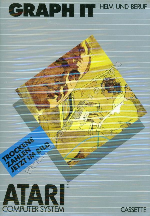
Q: Would you ever consider getting back into it?
Bill Haslacher: For years I've invested in the Stock Market. I've read books about Warren Buffett and like the books of Peter Lynch and John Train. Anyhow, working for the likes of Sun (and its ilk) got to me. Tech writers were not well regarded toward the end of my career. The programmers sorta felt they were superior to us and let us know it. Anyhow, the computer business no longer interested me and I turned to stock market investing full-time.
Color me happily retired. :)
Q: Do you still lives in Silicon Valley?
Bill Haslacher: Yes, believe it or not I still live in the same place in downtown San Jose that I lived in when I worked for Atari!
Q: Which of the titles you worked on are your favorite, and what types of games in general?
Bill Haslacher: I enjoyed Graph It and Atari Microsoft BASIC. Both let me explore new ways of presenting stuff. I love role-playing games (RPGs). Also, I still like puzzle games such as Chips Challenge.
In closing, here’s Bill’s story about how Harry Brown found (and exploited) a bug in Chris Crawford’s game, Eastern Front:
Bill Haslacher: The following Atari story was written in 1995. James Catalano published it in METROPOLIS, a 'zine with a small, but very loyal, readership. James let me retain all rights (and wrongs) to the article:
|
The Game Room By Bill Haslacher All is fair in love and war. In 1981 I could have wadded up a piece of paper and lobbed it into the cubicle of Chris Crawford, pioneer Atari game programmer. Not that I would have. Chris always looked so peaceful sitting in the lovely wooden rocking chair he had in his office that it would have been a shame to disturb him. When I reflect on my two years of "working" for Atari, I have to admit we Atarians enjoyed our work. For example, one spring day in 1981, Harry Brown, an Atari programmer and game tester stopped me in the hall and said that he had found an easy way to beat Eastern Front - Chris Crawford's pioneering computer war game. So I stopped by Harry's cubicle, and, sure enough, Harry had found an easy way to beat Eastern Front. The trick, Harry said, was to march as many of your troops as fast as you could to the right (East) of your screen. You did not stop for anything. You did not engage with the Russians. If you executed the "Harry Brown" maneuver correctly, you would wind up with the bulk of your troops in the white or winter area when winter set in. This sounded like a very bad idea to me. But Harry patiently explained to me that your troops became in his words, "like white bunnies on white snow." He went on to explain that the computer could not check for white on white and you were thus invisible and could fire on the Russians at will. I asked Harry if he had talked to Chris about his discovery. He said when he told Chris about it, Chris had said, "That's cheating!" Harry said all he could do was smile and reply, "All is fair in love and war." |
And here's an unpublished article of Bill's that was originally meant to be published by Hi-Res:
Bill Haslacher: Hi-Res was a short lived Atari Computer magazine. The handwriting on my galley proof says, "Deadline for Issue 4 is Dec. 19, 1983". Well, to make a long story short, Hi-Res folded and my unpublished column lay buried under a stack of papers. Until now.
|
"What Went Right at Atari" By Bill Haslacher "Have you been playing video
games?" It's 1980, my first week at Atari and the boss wants to know if I'm
playing video games. SCHLADGE CARDS. These handy cards got you in and out of the various Atari departments. If you were not allowed into a department, the Schlage card device would make a clicking sound and your attempt was recorded on a computer somewhere. Rumor had it that Atari engineers tried to figure out how the cards worked. They succeeded in making fake cards within 15 minutes. Steve Harding says one of the founding engineers forgot his Schlage card one weekend day and kicked the door down to get in. APPLE SIGN. One bright and sunny day an Apple Computer warehouse appeared next
to the cubic monolith that was Atari's engineering building. Some of the
Atari people grabbed a brightly colored sign with an Apple on it and placed it
in the Atari engineering department. Two months later, uniformed police
officers showed up to reclaim the sign.
ASTEROIDS. In the lobby of the
engineering building, someone changed the flying saucers to flying turtles.
OK, who changed the shape table in the Asteroids game? |
Visit Bill Haslacher’s website, at: http://haslacher.tripod.com/